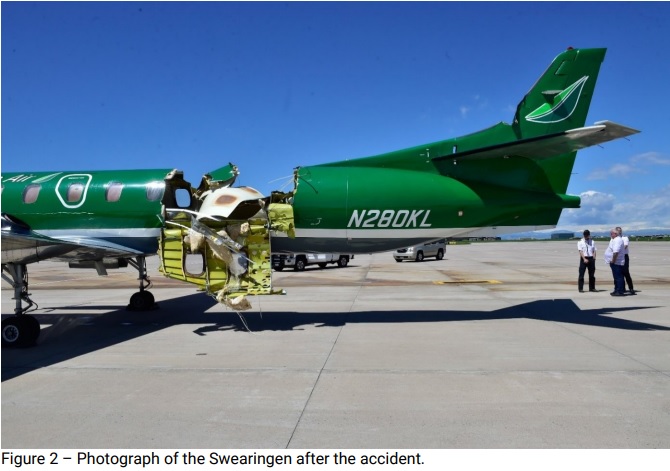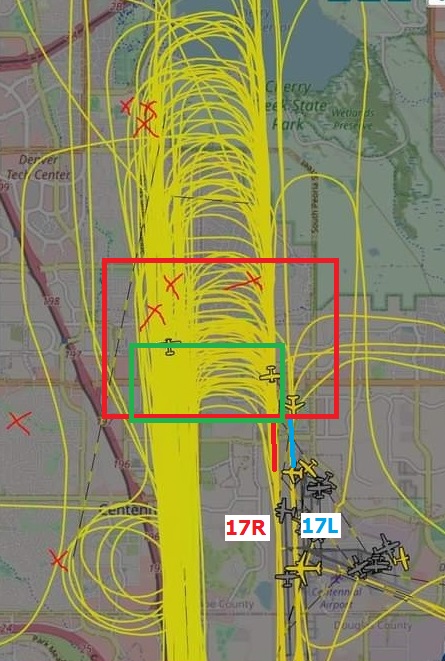Centennial Airport (KAPA, southeast of Denver) is one of the current top five impacting airports in the U.S. These are general aviation impacts, caused by small single-prop and twin-prop planes staying in the pattern and doing touch-and-goes to the west parallel runway (runways 17R/35L).
Back in May 2021, there was a midair collision when a Cirrus arrival to 17R overshot the final approach course (the line extending north of runway 17R); its prop slashed a series of cuts into the top of the fuselage of a KeyLime metroliner on final to land runway 17L. Amazingly, nobody was killed.
It is one thing for a midair to happen far from an airport, when two planes just randomly meet. But, this midair was particularly troubling, because the flights were being controlled by KAPA tower controllers. Through complacency, they failed to actually work the 17R arrival; they failed to apply positive control by extending the Cirrus on the downwind for just a few more seconds, and they failed to assure the pilots actually saw one another.
This failure triggered a reaction by FAA management: complacency was to be checked, and positive control was to be rigorously applied. But, no policies were implemented to actually LIMIT the number of aircraft in the pattern. Thus, abandonment of the near-lethal complacency standard forced KAPA ATC personnel to extend the overfilled 17R pattern to the north, impacting residents below.
Here’s a screencap showing two hours of KAPA flights last December. It is an ugly picture, but the numbing and incessant drone is even uglier. A red box has been added, outlining the region where base turns would happen in a pattern not overfilled with too many flights. Note the current 17R ‘pattern elongation’ extends miles further to the north, even over the reservoir. Note also that, if ATC chose to reduce risks and limit the number of aircraft staying in the 17R pattern, the base turns would be mostly confined to the smaller green box, much closer to the runway… and the impacts on residents would be significantly reduced.
It is an ugly picture, but the numbing and incessant drone is even uglier. A red box has been added, outlining the region where base turns would happen in a pattern not overfilled with too many flights. Note the current 17R ‘pattern elongation’ extends miles further to the north, even over the reservoir. Note also that, if ATC chose to reduce risks and limit the number of aircraft staying in the 17R pattern, the base turns would be mostly confined to the smaller green box, much closer to the runway… and the impacts on residents would be significantly reduced.
This is the core frustration thousands have with FAA, CACNR, and the airport: the impacts are huge, and nobody is cooperating to mitigate the impacts.
More than two months ago, FAA attended a Centennial Airport Community Noise Roundtable (CACNR) meeting, on February 1, 2023. Questions then produced this 9-page letter from FAA Regional Administrator Grady Stone, to the CACNR Chair, Brad Pierce.
The letter is long and dry and somewhat confusing. Many of the FAA answers refer back to earlier answers, which tends to diminish letter comprehension. To fix this problem, a modified version of the original letter has been created; content has been reformatted, and each question and FAA answer is provided within a table. Reference portions have been added using a smaller red text. Two dominant response ‘themes’ have been highlighted in color: FAA’s declaration that they did not change how the KAPA traffic pattern is managed (oh, really?!?), and FAA’s assertion that they lack authority on many aspects of air traffic management such as making decisions about numbers of operations (yeah, right!!). Use these links to view copies:
- [link] to view the modified version of the original letter, or
- [link] to view a PDF copy of the original 9-page letter.
There was a third dominant response ‘theme’ in the FAA letter, and it is a doozy: a false claim that the KAPA traffic pattern has ‘elongated’ due to increased traffic volume. This is interesting. While the bulk of the letter is just repetitive denials by FAA, within the letter FAA does concede REPEATEDLY that, yes, the traffic pattern has elongated. But, instead of also conceding the cause of elongation we all know (reaction to the May 12, 2021 midair collision worked by the KAPA control tower), FAA insists traffic volume is the cause. As the Analysis below clearly shows, FAA is wrong, and FAA is lying.
A PDF copy rebutting FAA’s false claims about increasing traffic volume at KAPA is embedded below; move the cursor to the bottom left corner and use the up-down arrows to scroll through the three pages.
20230413.. Debunking false detail in ANM.RA.G.Stone’s letter, KAPA ops counts are solidly down (zz32KAPA, 3p)
Scroll over the PDF above to activate the PDF viewer controls at the bottom; page-scroll with the arrows in the bottom left corner, or use +/- to zoom in/out.


